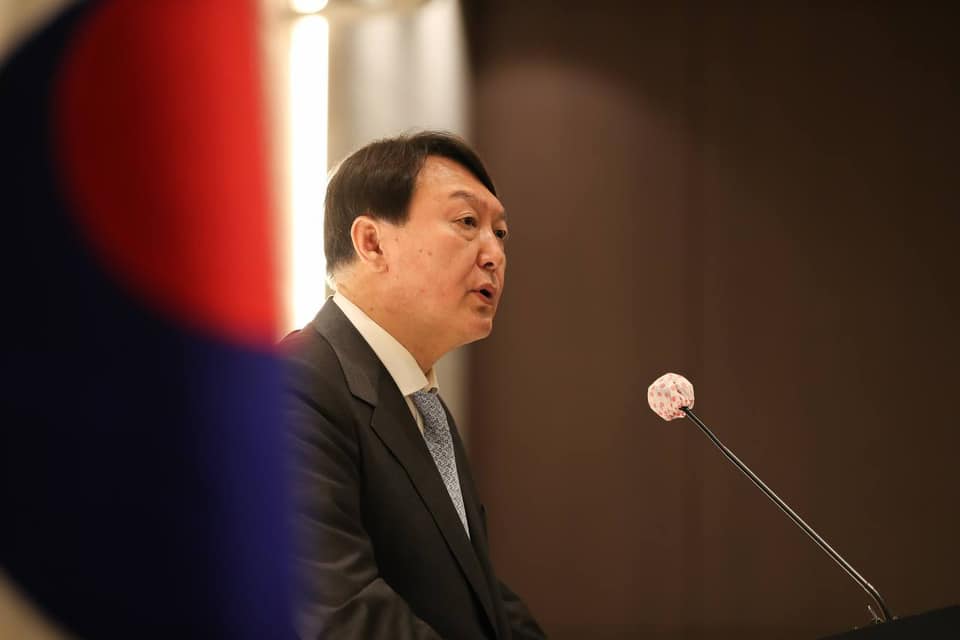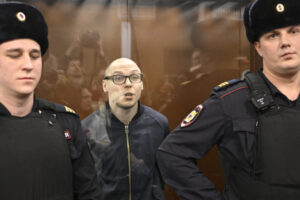Martial Law in South Korea: Understanding Events and Aftermath
Daniel Spencer reports on the events and aftermath of the imposition of martial law in South Korea.

President Yoon Suk Yeol / Image Credit: Flickr
Developments in South Korea see acting president Han Duck-soo impeached, just two weeks after also voting to impeach previous President Yoon Suk Yeol.
Suspended President Yoon Suk Yeol has also been accused by prosecutors of ordering the military to use guns on lawmakers attempting to vote down the martial law decree proposed by Yoon in early December.
What Sparked This Unrest?
Recent developments follow events on December 3, when at 10:27 pm, South Korean President Yoon Suk Yeol declared martial law via a television broadcast.
Martial law is the temporary substitution of civilian government by military rule, and subsequently, it replaces existing laws and civil rights with military law. The South Korean President has the constitutional right to invoke it when civil authorities are deemed unable to function, usually during times of war, rebellion, or natural disaster.
In the broadcast, President Yoon cited the continuous impeachment of members of his cabinet, and the reduction of military and police budgets, which he claimed was an act of subversion by the parliament.
He repeatedly painted the Democratic Party, the opposition party who hold a parliamentary majority, as an “anti-state” party, repeating the phrase six times in the minute-long broadcast. Ultimately, he claimed the decision was aimed at eradicating “pro-North Korean forces and to protect the constitutional order of freedom”.
Yoon has continuously struggled to have motions passed through the opposition-dominated parliament, and has opposed multiple investigations into events involving his wife, Kim Keon-hee. This has lead some to label the declaration as a consequence of his frustration, with expert Shin Giwook describing the decision as “an attempt to assert authority in a climate where his favorability has been declining.”
Article 77 of the South Korean constitution stipulates that “when the National Assembly demands the repeal of martial law with the approval of a majority of its members, the president must comply and revoke the martial law.” An article implemented following previous abuses of martial law.
Usually, during national incidents such as this, the government alerts the population via text, however, such action was not taken. The declaration being made at night has been suggested as an attempt to go undetected.
At least 280 military officials entered the parliament building, some by breaking windows, and attempted to enter the main hall, where the vote would take place. Lawmakers and parliamentary staff prevented their entry, forming human walls, barricading doors and spraying the personnel with fire extinguishers.
MP Jung Suyeon states that she crawled through the legs of the military to enter the building. Out of 300 lawmakers, 190 made into the building, where the vote to end martial law was passed 190-0.
Protestors clashed with police outside the building. A viral clip online shows politician Ahn Gwiryeong grabbing the barrel of a soldier’s rifle, shouting, “aren’t you ashamed of yourselves?”
Some have suggested military personnel appear to have been reluctant to follow orders, citing there were no shots fired, as well as there allegedly being little attempts to prevent lawmakers from climbing over the fences to reach the building. This alleged hesitance has been cited as a likely key factor in the failure of Yoon’s coup d’etat.
Police and military personnel left the building following the vote, and martial law formally ended at around 4:30 AM.
The Aftermath
The following day, thousands attended a candlelit rally on the streets of Seoul. Signs called for Yoon’s resignation, and protestors chanted “Yoon out now!”. These candlelit rallies evoke those of 2016, prior to the impeachment of former president Park Geunhye.
Shin Giwook describes Yoon’s declaration as “political suicide”. Opposition parties submitted a formal call for his impeachment. They hold 192 seats. Although 200 are required, many in Yoon’s own party voted against him to end martial law.
This was the first declaration of martial law since the end of Chun Doohwan’s military dictatorship in 1987.
On December 7, Yoon apologised to the nation on television. On the same day, the vote for Yoon’s impeachment failed. The required vote of 200 out of 300 lawmakers was not achieved due to a boycott of the vote by members of his party.
However, on December 14, MPs successfully voted for Yoon to be impeached. The decision was met with cheers from protestors who gathered outside South Korea’s National Assembly.
The prime minister, Han Duck-soo, was announced as the acting president. Yet, on December 27, lawmakers also voted to impeach Han, following accusations of insurrection from Opposition MPs that Han was stalling proceedings in Yoon’s impeachment trial.
On the same day, the finance minister, Choi Sang-mok, was declared the new acting president, vowing “an all-out effort to stabilise state affairs”.
Words by Daniel Spencer






Your blog is a treasure trove of valuable insights and thought-provoking commentary. Your dedication to your craft is evident in every word you write. Keep up the fantastic work!HABANERO88
Your blog is a constant source of inspiration for me. Your passion for your subject matter is palpable, and it’s clear that you pour your heart and soul into every post. Keep up the incredible work!HABANERO88
Noodlemagazine This is my first time pay a quick visit at here and i am really happy to read everthing at one place
Noodlemagazine I am truly thankful to the owner of this web site who has shared this fantastic piece of writing at at this place.